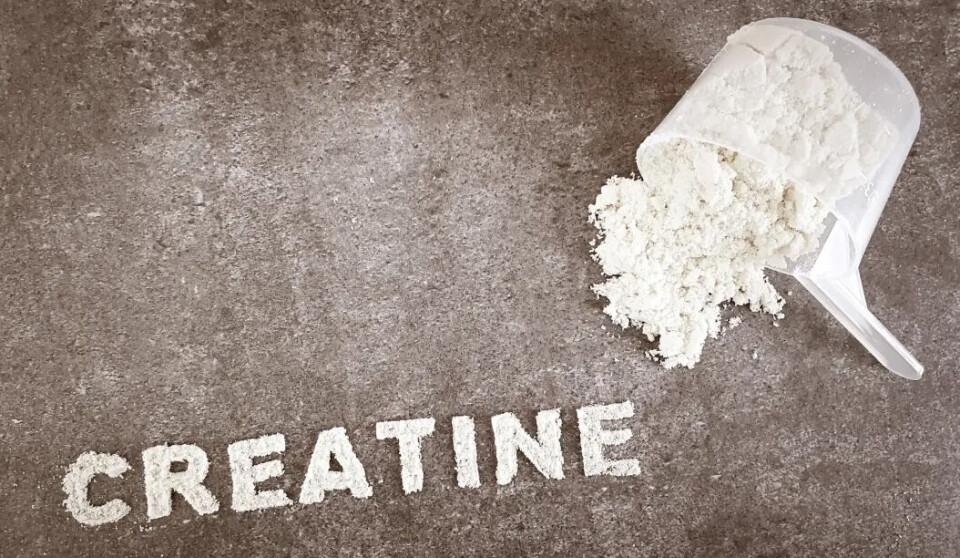THIS CONTENT IS BROUGHT TO YOU BY THE University of Agder - read more
Everything you need to know about creatine
One of the most popular supplements at the moment is creatine. Here is everything you need to know about its use, side effects, and what it can – and cannot – do.

Creatine is a substance that occurs naturally in our bodies. It is also found in meat and fish. It acts as an energy booster, enhancing strength, endurance, and concentration.
The use of creatine has skyrocketed in recent years, particularly among young people. To better understand this trend, we consulted one of the leading experts in the field, Professor Sergej Ostojic from the University of Agder, to answer some frequently asked questions about creatine.
What is creatine?
“Creatine is an amino acid derivative with a structure very similar to glycine or arginine. Around half of our daily creatine needs are produced by the body, while the rest comes from our diet,” says Ostojic.
What foods are rich in creatine?
“You’ll find creatine in beef, poultry, and fish like salmon and herring. The average person needs approximately one gram of creatine per day, which you can get by eating about 100-150 grams of herring," he says.
Plants do not contain any creatine.
What does creatine do in the body?
“The main function of creatine is to provide energy, particularly to high-energy-demanding organs like muscles, the brain, and the liver. Creatine plays other roles as well, such as regulating appetite and acting as an antioxidant,” he says.
Antioxidants are substances that protect our cells.

Why do you think creatine supplements have become so popular?
“Over the past 20 years, research has shown that creatine has many applications beyond improving athletic performance. Creatine may help with brain fog, concentration issues, and sleep deprivation. It’s also effective for people with age-related muscle loss, known as sarcopenia,” says Ostojic.
Do we really need to take creatine supplements in Norway?
“For most people with a balanced diet, it’s not necessary. In the US, around two-thirds of the population don’t get enough creatine. There are no equivalent studies in Norway, but I believe we fare better due to our diet," he says.
Ostojic notes that many people are influenced by marketing and popularity without considering whether they actually need it.
"However, some groups are particularly at risk of creatine deficiency, such as vegetarians, older people losing muscle mass, and those with neurodegenerative diseases like multiple sclerosis. People with kidney diseases also often have lower creatine levels,” he says.
How can you tell if you’re getting enough creatine?
“People with low creatine levels often experience concentration problems, poor memory, and fatigue. We’ve also seen that individuals with long-term symptoms after Covid-19 often have low creatine levels in their muscles and brains, which could explain their persistent fatigue, he says.
A large American study with around 10,000 participants showed that people who consumed less creatine through their diet had a higher risk of depression.
Is it possible to measure creatine levels in the body?
“It's possible to measure it in the brain and muscles, but it’s expensive. There are fewer than 15 labs across Europe equipped to do it non-invasively," he says.
Ostojic instead recommends examining your diet. If you are vegan or vegetarian, for instance, you are likely consuming too little creatine.
How much creatine do people typically take as a supplement?
“I think that most Norwegians likely get about one gram of creatine daily from their diet, which is sufficient for normal bodily function. However, to achieve maximum performance benefits, it may be beneficial to take between three and five grams daily,” he says.
But how much is too much?
“Taking more than five to ten grams per day isn’t advisable for most people. More creatine isn’t necessarily better. Leading research institutions have studied how much creatine is needed to improve performance," he says.
Ostojic encourages people to read research-based information rather than relying on influencers on social media, where misinformation and myths about creatine are widespread.
Can creatine help build muscle without exercise?
Ostojic explains that for some groups, creatine can provide some muscle benefits even without resistance training. These groups include older individuals and those who do not get enough creatine through their diet.
However, the ideal approach is to combine creatine supplementation with resistance training or general physical activity. Creatine helps with energy production in muscles, while exercise stimulates muscle growth and strength.
"Even so, one to one and a half grams of creatine daily can benefit the general population without exercise. We just completed a study in the United States which showed that those who consumed more creatine through their diet had greater muscle mass, regardless of how physically active they were,” he says.
Does it matter when you take creatine?
“Research doesn’t provide clear answers about the best time to take creatine. We simply don’t have enough data to conclude whether one time is better than another, regardless of when you train,” he says.
Can creatine cause hair loss, muscle cramps, or reduced sperm production in men?
“Many well-controlled studies have investigated side effects, and none have linked creatine to issues like these, even though they are often discussed in popular science articles and blogs," he says.
The researcher notes that some people may experience muscle cramps, but this is usually due to the strain of exercise rather than creatine itself.
Does creatine cause cancer?
“Some lab studies with isolated cells have suggested that creatine might affect the growth of certain cancer cells. However, these studies used extremely high doses, equivalent to 100 grams in human nutrition," he says.
According to Ostojic, there is currently no evidence that creatine increases cancer risk in humans. On the contrary, some studies indicate that creatine may have a protective effect.
"My research group conducted a study last year with over 7,000 participants. We found that those with higher creatine intake through their diet had a lower risk of developing cancer. We need more research to understand how creatine might be used in cancer prevention,” he says.
Does creatine increase urine production?
“Creatine has the ability to retain water in the body, which may cause a slight increase in urine production. However, this effect isn’t significant enough to impact fluid balance to any considerable degree,” the researcher says.
Does creatine affect blood pressure?
“Some studies have suggested that certain creatine-like compounds may affect blood pressure. However, research on creatine from food or supplements shows no significant negative impact on blood pressure in healthy individuals,” he says.
Does the body produce less creatine if you take it as a supplement?
“The simple answer is yes. We’ve discussed how the body produces about one gram of creatine daily, while another gram comes from the diet. If you consume more than one gram daily as a supplement, the body’s natural creatine production gradually decreases," he says.
Another important factor is that after a few months of consistent use, the body adapts to the increased creatine intake. This means the benefits of supplementation plateau.
"To counteract this, it’s advisable to take a break from creatine supplementation for at least two weeks every three months,” the researcher says.
Can creatine help with sleep deprivation?
“Preliminary studies suggest that creatine may positively affect brain function under sleep-deprived conditions. This could benefit groups like healthcare workers, police officers, firefighters, or those in the travel industry," he says.
However, Ostojic emphasises that creatine is not an effective solution for severe sleep problems.
Ostojic’s research group recently published a study showing that people who consumed slightly more creatine from food experienced slight improvements in sleep quality. However, they also snored more.
Can creatine aid recovery from injuries or surgery?
“Yes, research shows that creatine can speed up rehabilitation after injuries. What’s particularly interesting is that creatine also appears to strengthen the body’s resilience, reducing the risk of musculoskeletal injuries and mild head trauma such as concussions,” he says.
Should adolescents be extra cautious when taking creatine?
“Creatine is probably one of the safest supplements available, but as a doctor, I’m cautious about recommending supplements to adolescents. Many young people using creatine aim to build bigger muscles and may be tempted to try more extreme substances, like steroids. It’s important to talk to teenagers about maintaining a healthy body image," he says.
Ostojic states that if creatine is used responsibly as part of a balanced diet, it can be a helpful tool for supporting good health.
However, he believes we need more research specifically focused on the safety of creatine use in adolescents. We also need more research on its potential long-term side effects.
Is it safe to use creatine during pregnancy?
Ostojic explains that there are currently few studies on the effects of creatine during pregnancy. Preliminary data suggests that creatine may be crucial for normal foetal development.
Research indicates that women who do not get enough creatine during pregnancy have a higher risk of giving birth to babies with lower birth weight and smaller head circumference. These are important indicators of healthy brain development.
"However, we lack definitive knowledge about how much creatine a pregnant woman should consume. Ongoing studies aim to provide better answers to this,” he says.
How safe is creatine as a supplement?
“Over 1,000 studies on humans have been conducted in the past 20 years or so. None have found serious health risks associated with creatine use. It’s considered safe when taken in moderate amounts, no more than 10 grams per day," he says.
Ostojic explains that consuming more than this may result in mild side effects, such as digestive issues, including loose stools or diarrhoea.
Additionally, people with kidney conditions should be cautious and stick to low doses, as excessive intake could place extra stress on the kidneys.
"Like any nutrient, it’s essential to find the optimal dose – neither too much nor too little,” says Ostojic.
Reference:
Antonio et al. Common questions and misconceptions about creatine supplementation: what does the scientific evidence really show?, Journal of the International Society of Sports Nutrition, vol. 22, 2024. DOI: 10.1080/15502783.2024.2441760

This content is paid for and presented by the University of Agder
This content is created by the University of Agder's communication staff, who use this platform to communicate science and share results from research with the public. The University of Agder is one of more than 80 owners of ScienceNorway.no. Read more here.
More content from the University of Agder:
-
Fear being rejected: Half pay for gender-affirming surgery themselves
-
Study: "Young people take Paracetamol and Ibuprofen for anxiety, depression, and physical pain"
-
Research paved the way for better maths courses for multicultural student teachers
-
The law protects the students. What about the teachers?
-
This researcher has helped more economics students pass their maths exams
-
There are many cases of fathers and sons both reaching elite level in football. Why is that?




































